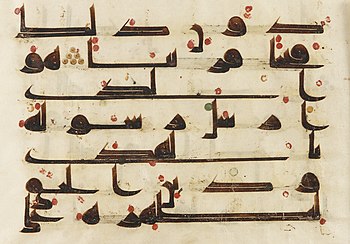

This article uses texts from within a religion or faith system without referring to secondary sources that critically analyze them. Please help improve this article. (March 2015) (Learn how and when to remove this message)
|
| الْفَتْح Al-Fatḥ The Victory | |
|---|---|
|
| |
| Classification | Medinan |
| Other names | Conquest |
| Position | Juzʼ26 |
| No.ofRukus | 4 |
| No.ofverses | 29 |
← Quran 47
Quran 49 →
| |
| Quran |
|---|
|
|
Divisions |
|
Content |
|
|
|
|
|
|
|
Characteristics |
|
Related |
|
|
Al-Fath (Arabic: الفتح, al-fatḥ; meaning: "the victory") is the 48th chapter (surah) of the Qur'an with 29 verses (ayat). The surah was revealed in Madinah in the sixth year of the Hijrah, on the occasion of the Treaty of Hudaybiya between the Muslim city-state of Madinah and Makkan polytheists. It mentions this victory, then criticizes the attitudes of the hypocrites, continues with further promises to the Muslims, and ends by mentioning certain important virtues of the Muslim community.[1]
The chapter gets its name from the opening verse, which states "Indeed, We have granted you a clear triumph..." in direct reference to the Treaty which was signed through cooperation between the opposing forces and without bloodshed. The reason this treaty, and therefore chapter, is called a "clear triumph" is largely believed to be because of its peaceful nature.
48:10 focuses on the importance of being dedicated to God. Those who do not dedicate themselves to God and remain that way will have their souls suffer. Those who stay dedicated to God will be rewarded by God.[3]
48:16 contains many predictions in this surah, such as:[4][5]
48:18-19 is regarding the Treaty of Hudaybiyyah.[4]

48:27 is regarding The first pilgrimage.[4]

| International |
|
|---|---|
| National |
|
| Other |
|